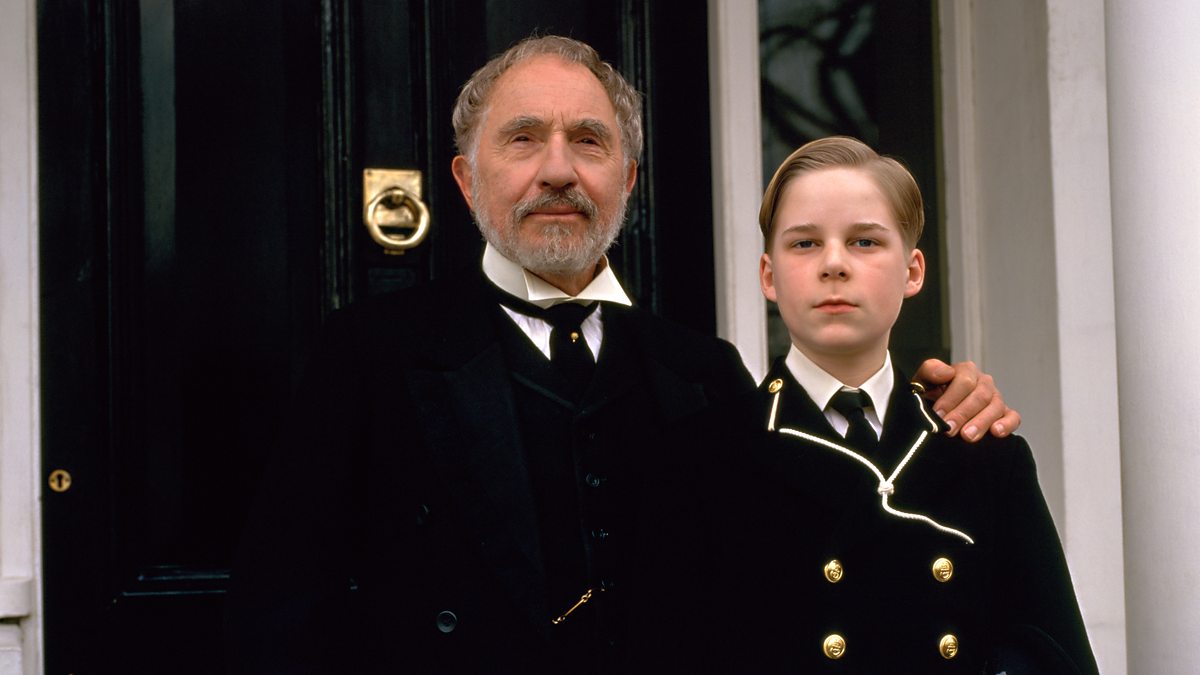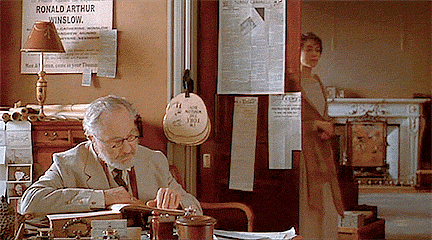Justice Without The Court Room? The Winslow Boy (1999) Film Review
"Very easy to do Justice. Very hard to do Right."
As a father toasts to his daughter's engagement, he learns that his 14 year old son, Ronnie, has been expelled from the Osborne Naval College for stealing a five shilling postal order. The drama that unfolds soon after is less about the incident itself but the havoc it does to the Winslow family.
Originally conceived as an English play from 1946 by Terrence Rottigan, The Winslow Boy is set against the strict codes of conduct and manners of the age; based on a father's fight to clear his son's name. To clear the boy's name was imperative for the family's honor; had they not done so, they would have been shunned by their peers and society.
The themes in the film are of innocence, family, justice and of sacrifice. Ronnie, or Ronald Winslow (played by Guy Edwards) , claims to be innocent of stealing the postal order; his father points out that in his day, no one would be expelled for such a small crime. The message of the film, simply put, is for right to reign over wrong. The film certainly a clear preference of style over substance, as the plot itself may no mean a lot, specially in this age of Blockbusters. This vey thing however, works to its advantage is the charm of the film. The film wouldn't work half as good if it was set in a more recent time period.

As in real life, in the film The Winslows succeed in engaging the most highly sought after barrister in England at the time, Sir Robert Morton, known also as a shrewd opposition member of the British Parliament. The government is strongly disinclined to to allow the case to proceed, claiming it is a distraction from the more important bureaucratic work of the Admiralty. In the face of public sympathy garnered through Ronald's siblings' efforts, and of Sir Robert's impassioned speech in the House of Commons however, the government yields. The case is thus allowed to come to court.

The performance by the cast shine the most when the characters they are enacting go through emotional highs and lows, with Jeremy Northam perfectly capturing the arrogance and charm of Sir Robert. Rebecca Pidgeon too has captured the character of Catherine Winslow, a sister seeking justice for her brother. Arthur Winslow, Ronnie's father is played by Nigel Hawthrone, captures the complex character. The First Lord of Admiralty, played by Neil North is actually the same actor who played Ronnie in the first film adaptation of the play of the same name, in 1948 (Live enough to see yourself as the villain?). David Mamet's directing skills play a major role in bringing these characters to life, and has been monumental to the play's success.
The main sublot of the film deals with Catherine, as her engagement is torn apart because of the drama. While sympathetic, the film has also given hints that Catherine perhaps never wanted to marry the man she was engaged to anyway, as evident by the dialogue between her and her parents at the start of the film:
"You don't behave as if you are in love."
To this, Catherine replies,
"How does one behave as if one is in love?"
To which, Arthur comments,
"One doesn't read "The Social Evil and The Social Good." One reads Lord Byron."

When the case ultimately comes to court, it is quickly won within days by Sir Robert. This is the most aspect of the film: although it builds up for what would be an big and dramatic trial scene, the audience never sees it. A film about a trial without even showing the trial itself? That's something one doesn't see everyday. The answer to this rather absurd question comes in the form of Rattigan's choice of themes. The focus is on the family members and the drama it brings upon the household, not the trial itself.
Although the family has won the case, it has taken a toll on them. The costs of the suit and publicity campaign have prevented Roland's older brother from pursuing his career of Civil Service, and had to give up his Oxford degree. This is reflected by the visual cues in the film, as in the beginning they all wear expensive and elegant suits, and near the end, it has been replaced by noticeably cheaper variants.

"Oh, do you really think so, Sir Robert? How little you know about women. Good-bye. I doubt that we shall meet again."
and the reply,
"Oh, do you really think so, Miss Winslow? How little you know about men."
makes it clear that Catherine and Sir Robert are meant to be together.
Conclusion:
The film overall is very British, and a reminder of the times, over a century ago. The well paced dialogue and the atmosphere fit well into the period, and it is a film where the various subplots gradually take over the main plot of the film. Watching this film, expecting to see grand clashes between the two parties would be mistake. A more worthwhile prospect would be to see the etiquette of the time in action, as well as to see a good period drama unfold.
It is a good recommendation to anyone who is interested in the Edwardian era, as well as fans of classic films.
 |
| Thanks For Reading! |
Also follow us on these sites and never miss a post again!
Cool review,my friend. Keep up the good work!
ReplyDelete